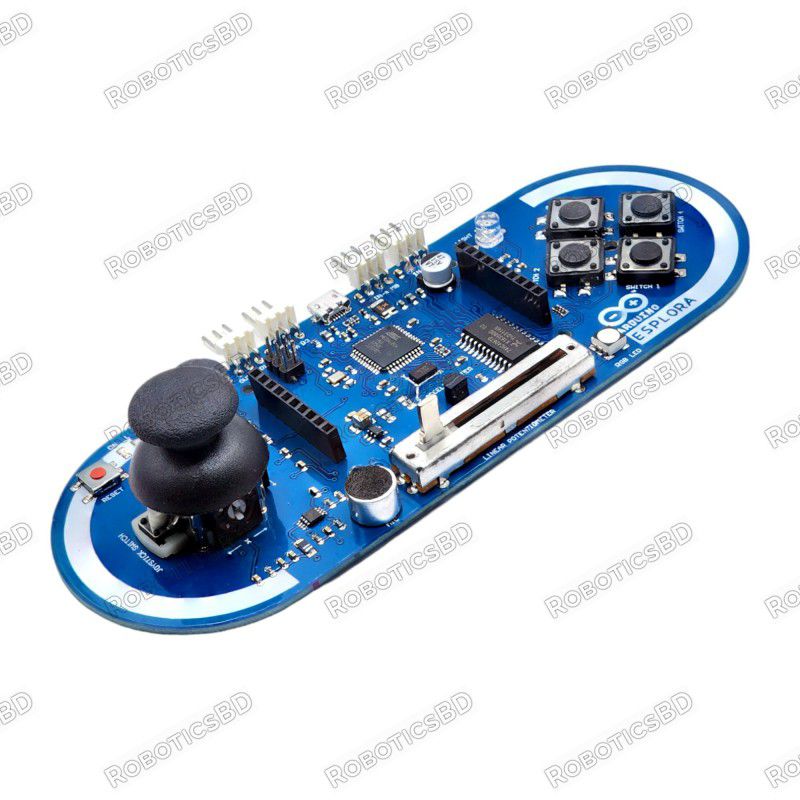
Reference: RBD-1217
Banner




 Security policy
Security policy
(edit with the Customer Reassurance module)
 Delivery policy
Delivery policy
(edit with the Customer Reassurance module)
 Return policy
Return policy
(edit with the Customer Reassurance module)
The ESPLORA Joystick Photosensitive Sensor Board is a microcontroller board compatible with Arduino & derived from the Arduino Leonardo. The ESPLORA Joystick Photosensitive Sensor Board differs from all preceding Arduino boards in that it provides a number of built-in; ready-to-use set of onboard sensors for interaction.
It’s designed for people who want to get up and running with Arduino without having to learn about the electronics first. For a step-by-step introduction to the Esplora; check out the Getting Started with Esplora guide.
The ESPLORA Joystick Photosensitive Sensor Board has onboard sound and light outputs, and several input sensors; including a joystick, a slider, a temperature sensor, an accelerometer, a microphone, and a light sensor. It also has the potential to expand its capabilities with two Tinker-kit input and output connectors, and a socket for a color TFT LCD screen.
Like the Leonardo board, the ESPLORA Joystick Photosensitive Sensor Board uses an Atmega32U4 AVR microcontroller with 16 MHz crystal oscillator. And a micro USB connection capable of acting as a USB client device like a mouse or a keyboard. In the upper left corner of the board, there is a reset push button, that you can use to restart the board.
ON [green] indicates whether the board is receiving power supply
L [yellow] connect directly to the micro-controller, accessible through pin 13
RX and TX [yellow] indicates the data being transmit or receive over the USB communication
The board contains everything need to support the microcontroller; simply connect it to a computer with a USB cable to get started. The Esplora has built-in USB communication; it can appear to a connected computer as a mouse or keyboard, in addition to a virtual (CDC) serial / COM port. This has other implications for the behavior of the board; these are detailed on the getting started page. You can find all the information you need to configure your board, use the Arduino Software (IDE); and start to tinker with coding and electronics.
The design of the ESPLORA Joystick Photosensitive Sensor Board recalls traditional gamepad design with an analog joystick on the left and four push buttons on the right. The ESPLORA Joystick Photosensitive Sensor Board has the following onboard inputs and outputs :
Analog joystick with central push-button two axes (X and Y) and a center pushbutton.
4 push-buttons laid out in a diamond pattern.
Linear potentiometer slider near the bottom of the board.
Microphone for getting the loudness (amplitude) of the surrounding environment.
Light sensor for getting the brightness.
Temperature sensor reads the ambient temperature.
Three-axis accelerometer measures the board’s relation to gravity on three axes (X, Y, and Z).
The buzzer can produce square-waves.
RGB led bright LED with Red Green and Blue elements for color mixing.
2 TinkerKit Inputs to connect the TinkerKit sensor modules with the 3-pin connectors.
2 TinkerKit Outputs to connect the TinkerKit actuator modules with the 3-pin connectors.
TFT display connector for an optional color LCD screen; SD card, or other devices that use the SPI protocol.
In order to utilize the total number of available sensors, the board uses an analog multiplexer. This means a single analog input of the microcontroller is shared among all the input channels (except the 3-axis accelerometer). Four additional microcontroller pins choose which channel to read.
The Leonardo the ESPLORA Joystick Photosensitive Sensor Board has a number of facilities for communicating with a computer; another Arduino, or other micro-controllers. The ATmega32U4 provides serial (CDC) communication over USB and appears as a virtual com port software on the computer. The chip also acts as a full speed USB 2.0 device, using standard USB COM drivers. On Windows, a .inf file requires.
The Arduino software includes a serial monitor which allows simple textual data to be sent to and from the Arduino board. The RX and TX LEDs on the board will flash when data is transmitting via the USB connection to the computer. The ATmega32U4 also supports SPI communication, that access through the SPI library. The Esplora can appear as a generic keyboard and mouse and can be a program to control these input devices using the Keyboard and Mouse libraries.
Specific References
Your review appreciation cannot be sent
Report comment
Report sent
Your report cannot be sent
Write your review
Review sent
Your review cannot be sent
Reference: RBD-1217
Reference: RBD-0323
Reference: RBD-2789
Reference: RBD-2267
Reference: RBD-2309
Reference: RBD-0155
Reference: RBD-2490
Reference: RBD-2484
Brand: Arduino Official
Reference: RBD-2569
Reference: RBD-1402
Reference: RBD-0621
Reference: RBD-2160
Reference: RBD-0094
Reference: RBD-2651
Reference: RBD-1138
Reference: RBD-1603

check_circle
check_circle